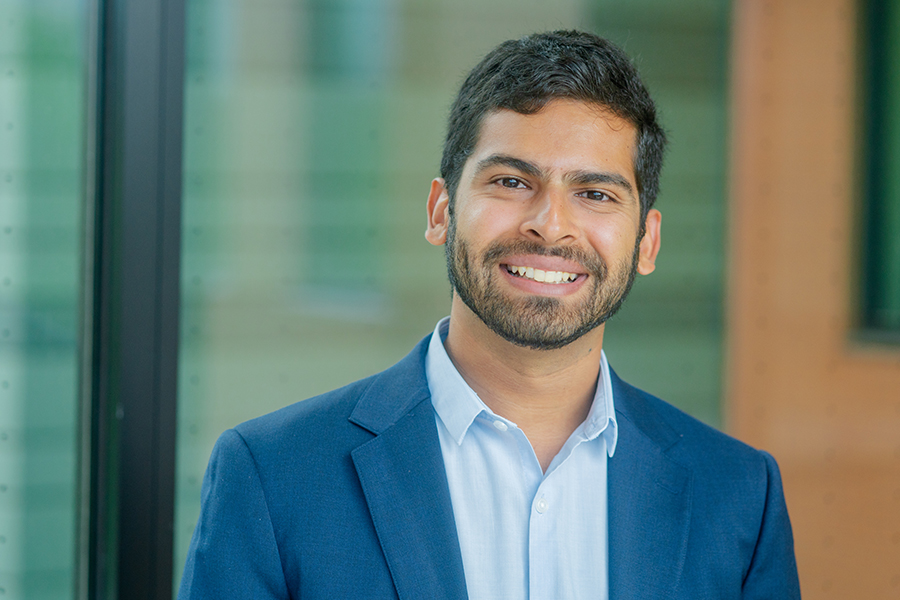Department Spotlight: Sarfaraz Serang

Sarfaraz Serang, one of the newest USU Psychology Department faculty, has a focus on quantitative measures; he sees the future of data analyzation. His interests focus on developing modern statistical methods for use in social sciences. Serang hopes to bridge the gap between the technological advances of the past few decades and the way quantitative methods are taught and researched today. He works to combine statistics and computer science in innovative new ways to exceed previous limitations faced by social scientists.
I think every student is different, so I try to adapt my mentorship style to best match what each student needs to succeed. My hope for my students is that by the time they leave my lab, they're independent thinkers and workers.
Serang has always been an Aggie at heart, completing his undergraduate education as an Aggie at UC Davis and now as part of the Aggie family at USU. He received his MA and PhD in psychology with a focus on quantitative methods at the University of Southern California. Serang has been adopted into one of the biggest departments on campus. After his first year with the department, he has found is place and is grateful for the incredible people at USU who have welcomed him and continue to support him in his journey.
What is your favorite thing about living in Logan?
The skiing! I’ve never lived in a place with snow so I was a bit apprehensive, but the skiing has won me over. I learned how last season and now I try to go as often as I can. Nothing better than a face full of snow to start your day!
What drew you to USU?
The environment and the people. Both the college and the department have been very supportive and have gone out of their way to create an environment where I can succeed. They want me to do great research, which is exactly what I came here to do. The faculty here are also incredible, both at what they do and as people. I’ve learned so much from them already, and I enjoy spending time with them both inside and outside the workplace.
Tell us about your research.
With the technological advances we’ve made over the last couple of decades, the amount and variety of data we can collect is unimaginable. Unfortunately, most of the quantitative methods curriculum is still half a century behind, so the people analyzing that data are generally doing it the same way they did it back then. My research focuses on trying to leverage what we’ve learned over that time across various disciplines and adapt it to the needs of modern-day social science researchers.
My substantive interests involve understanding cognitive change over time. I’m fascinated by change, and I found that studying models for change was the most interesting and effective application of my skillset. Check out my lab website for more information about my methodological research.
What are your mentorship style and lab like?
I think every student is different, so I try to adapt my mentorship style to best match what each student needs to succeed. I try to give students projects that help them learn important skills, and I meet with them regularly to keep an open line of communication. My hope for my students is that by the time they leave my lab, they’re independent thinkers and workers, and that they have their own sustainable research program.
I’d like my lab to be a place where people work on interesting and important problems. I want to work on the papers that excite me, ones that introduce something new, or ones that change the way I think about a problem. I also think it’s important for our work to have an impact beyond our own niche; I’ve been branching out by working on more interdisciplinary projects. I hope that the time spent in my lab helps students achieve their educational and career goals.
What advice do you have for students?
Figure out what it is you want to do. I don’t expect students to know now exactly what they want to do for the rest of their lives, but I find that we spend too much time waiting for our passions to find us instead of actively seeking them out. Education is an amazing journey. Having a target, like a field they’d like to work in or a specific job they’d like to have, helps bring context to what they learn and motivation to learn it. When taking a walk, it helps to have a sense of where we’re going.
The Quantitative Psychology program is accepting students for our Ph.D. program, so if you or someone you know is interested, please apply. If you’d like more information about the program feel free to contact me or one of the other faculty members in the program, Christian Geiser or Ginger Lockhart.

